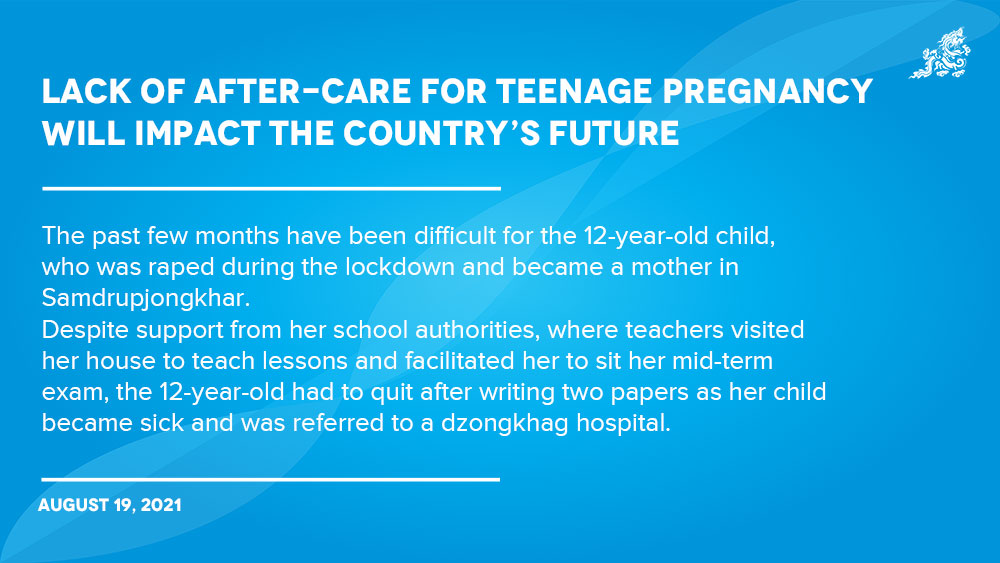Tashi Dema
The past few months have been difficult for the 12-year-old child, who was raped during the lockdown and became a mother in Samdrupjongkhar.
Despite support from her school authorities, where teachers visited her house to teach lessons and facilitated her to sit her mid-term exam, the 12-year-old had to quit after writing two papers as her child became sick and was referred to a dzongkhag hospital.
The child was then referred to Trashigang and Mongar regional referral hospital. “If the child’s health doesn’t improve, they might have to come to Thimphu,” a counsellor with Nazhoen Lamtoen, Tshering Deki, said.
Nazhoen Lamtoen is the only non-profit organisation that had reached out to the child and extended support as of now.
Tshering Deki said that while the news of the child giving birth made headlines, people forgot about the minor. “No one knows the hardship she or children, who become mothers, go through.”
She said that besides the stress of being a child mother, the minor also have physical and emotional traumas. “People assume that many women in the past gave birth at a young age and take teenage pregnancy lightly, but the child is robbed off her innocence at a young age and has to shoulder the responsibility of a mother.”
The counsellor also said that the minor had to drop out of school although she is interested to continue because of the child. “She is losing an academic year and is travelling for the child’s health.”
Health officials have explained that teenage pregnancy pose a risk to the mother as the body is not fully developed and also pose a greater risk to the babies.
With as many as 330 cases of teenage pregnancy reported in 2020, social workers said that there is no after-care for teenage mothers, which will affect the mental health of teenagers, as they have to deal with trauma, emotional injuries and stigma.
RENEW’s executive director, Tshering Dolkar, said that Bhutan lacks research to understand why there are lots of teenage pregnancies. “There has to be policy intervention based on research.”
She also agreed that serious issues like teenage pregnancy and sexual assaults are taken lightly.
According to the executive director, many people accept teenage pregnancy because child marriage was a practice in the olden days. “Times and needs have changed. The way children are brought up has changed. ”
She explained that strong parenting programmes are needed and that parents have to understand that safeguarding children is important. “Parents and society need to know times are changing and the protection system should be geared for the changes.”
Tshering Dolkar said that without receiving proper support and counselling, victims of sexual assaults, especially teenagers, will have difficulty coping up in life and will not be productive citizens. “When an individual is not productive, it is the country’s future that is affected.”
She said that Bhutan, as a GNH and blessed country, cannot afford to have an emotionally injured future generation. “Service providers, policymakers, parents, teachers and community should come together to safe our children.”
According to the executive director, many people who have mental health issues have underlying problems as they were subjected to trauma, violence and poverty.
She cited the example of how a girl, who was raped when she was four-year-old, is having difficulty moving on in life and have relationship issues because of the trauma.
Social workers said that policy dialogues are needed to put a strong protection system in place as there are gaps.
A senior programme officer of the child division in National Commission for Women and Children (NCWC), Kinley Dorji, said national child policy is in draft form. “It has a holistic approach to child protection.”
An official of RENEW said that if education ministry adopts the policy, it will make an impact.
The social worker said policymakers should know the gap and it is important to train people to recognize, identify and provide services. “Teachers must be trained in child protection, how to identify children in distress and where to refer.”
Sources explained that while things have improved in the way schools handle such issues from the 1990s and early 2000s, where schools used to terminate girls who are pregnant, a lot could be done.
While Kuensel is still waiting for NCWC to share data, RENEW’s Gawailing shelter has four cases of teenage pregnancy at the moment.
Sources also said sexual assault perpetrators should also undergo reformative exercises when under detention and policymakers should look beyond putting perpetrators in jail.
Meanwhile, a 13-year-old girl, who was raped by her cousin brother, gave birth in Thimphu few months ago.


